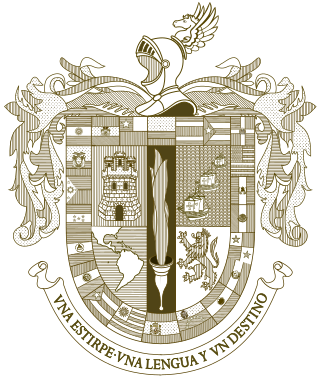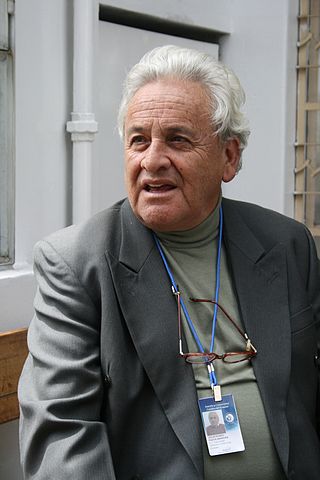Related Research Articles

Spanish or Castilian (castellano) is a Romance language of the Indo-European language family that evolved from the Vulgar Latin spoken on the Iberian Peninsula of Europe. Today, it is a global language with about 500 million native speakers, mainly in the Americas and Spain, and about 600 million when including speakers as a second language. Spanish is the official language of 20 countries, as well as one of the six official languages of the United Nations. Spanish is the world's second-most spoken native language after Mandarin Chinese; the world's fourth-most spoken language overall after English, Mandarin Chinese, and Hindustani (Hindi-Urdu); and the world's most widely spoken Romance language. The country with the largest population of native speakers is Mexico.

The Royal Spanish Academy is Spain's official royal institution with a mission to ensure the stability of the Spanish language. It is based in Madrid, Spain, and is affiliated with national language academies in 22 other Hispanophone nations through the Association of Academies of the Spanish Language. The RAE's emblem is a fiery crucible, and its motto is Limpia, fija y da esplendor.

The Association of Academies of the Spanish Language is an entity whose end is to work for the unity, integrity, and growth of the Spanish language. It was created in Mexico in 1951 and represents the union of all the separate academies in the Spanish-speaking world. The association publishes reference works on the Spanish language and commemorative editions of Hispanic literature, among other publications.

Záparo is a nearly dead language spoken by the Sápara, or Záparo, people of Ecuador. As of 2000, it was spoken by only one person out of a total population of 170 in Pastaza Province, between the Curaray and Bobonaza rivers. Záparo is also known as Zápara and Kayapwe. The members of the Záparo ethnic group now speak Quichua, though there is a language revival effort beginning. Záparo is sometimes confused with Andoa, though the two languages are distinct. Záparo has a subject–verb–object word order.
The Philippine Academy of the Spanish Language is the language regulator for Philippine Spanish, the variant of the Spanish language spoken in the Philippines. It is one of two Spanish language regulators located in countries where the language does not have an official status nationwide, the other being the North American Academy of the Spanish Language in the United States.

The Diccionario de la lengua española is the authoritative dictionary of the Spanish language. It is produced, edited and published by the Royal Spanish Academy, with the participation of the Association of Academies of the Spanish Language. It was first published in 1780, as the Diccionario de la lengua castellana and subsequent editions have been published about once a decade. The twenty-third edition was published in 2014; it is available on-line, incorporating modifications to be included in the twenty-fourth print edition.
The High Academy of the Quechua Language, or AMLQ, is a Peruvian organization dedicated to the teaching, promotion, and dissemination of the Quechua language.
The Academia Chilena de la Lengua is an association of academics and experts on the use of the Spanish language in Chile. It is a member of the Association of Academies of the Spanish Language and is a part of the Instituto de Chile.
The North American Academy of the Spanish Language is an institution made up of philologists of the Spanish language who live and work in the United States, including writers, poets, professors, educators and experts in the language itself. Its mission is to support and promote the study and correct usage of Spanish in the United States of America. The Academia, established in New York City in 1973, is a corresponding member of the Real Academia Española and a member of the Asociación de Academias de la Lengua Española, in Madrid, Spain.

The Academia Dominicana de la Lengua is the Dominican Republic's correspondent academy of the Royal Spanish Academy. It was founded in Santo Domingo on 12 October 1927 and, like the other academies, has the principal function of working to regulate the Spanish language.

The Academia Colombiana de la Lengua is an association of academics and experts on the use of the Spanish language in Colombia. It is based in Bogotá, Colombia's capital, and is a member of the Association of Spanish Language Academies.
The Academia Guatemalteca de la Lengua is an association of academics and experts on the use of the Spanish language in Guatemala. It was founded on June 30, 1887. It is a member of the Association of Spanish Language Academies.
The Academia Boliviana de la Lengua is an association of academics and experts on the use of the Spanish language in Bolivia. It is a member of the Association of Spanish Language Academies.
The Academia Hondureña de la Lengua is an association of academics and experts on the use of the Spanish language in Honduras. It was founded in Tegucigalpa on December 28, 1948. It is a member of the Association of Spanish Language Academies.
Esmeralda–Yaruro or Takame–Jarúroan, is a proposed connection between two unclassified languages of Venezuela and Ecuador: Yaruro, 6000 speakers, and the extinct Esmeralda. They would be only distantly related, but Kaufman (1990) finds the connection convincing, and Campbell (2012) believes the connection is promising.

Filoteo Samaniego Salazar was an Ecuadorian novelist, poet, historian, translator, and diplomat. He became a member of the Ecuadorian Academy of Language in 1984, and was its secretary from 1996–2006. He was awarded Ecuador's most prestigious prize, the Premio Eugenio Espejo, in 2001. Samaniego's diplomatic career began in 1949 as the chief of staff of the Ministry of Foreign Affairs of Ecuador. He served as Ecuador's Ambassador to Austria, Germany, Romania and Egypt; and was a permanent representative of Ecuador to the United Nations Industrial Development Organization (ONUDI); and held many other academic, national, and international posts in his lifetime. He translated books from French to Spanish, including the Spanish translation of Chronique (1960) by the French Nobel laureate Saint-John Perse.

Rodolfo Pérez Pimentel is an Ecuadorian lawyer, historian, and biographer. He was declared the lifetime chronicler of the city of Guayaquil, and is a member of the National Academy of Ecuadorian History. He was the 2005 recipient of the Premio Eugenio Espejo in Literature, awarded to him by President Alfredo Palacio.

Julio Pazos Barrera is a poet, writer, teacher, and cook.

Luis Aguilar Monsalve is an Ecuadorian writer, critic, and professor emeritus at Hanover College in the United States.
Cecilia Ansaldo Briones is an Ecuadorian professor, essayist, and literary critic.
References
- 1 2 3 ":: Enciclopedia del Ecuador :: - ACADEMIA ECUATORIANA DE LA LENGUA". Archived from the original on 2011-07-10. Retrieved 2010-03-01.
